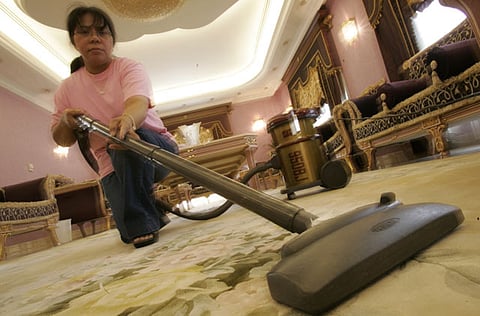UAE: Are we ready for a ‘maid-less society’?
Gulf News looks into the reliance on domestic helps in UAE households

Dubai: Countries willing to send their people to work in foreign homes with little assurance of protection and pay are becoming fewer. The Philippines, Indonesia, and Ethiopia once the major sources of foreign maids to the UAE — have temporarily shut their doors on maid deployment.
With the dwindling pool of nationalities available to work as domestic workers in the UAE, Gulf News asks if it is time for the society to learn to survive on its own without imported house help.
Dr Rima Sabban, associate professor of sociology at Zayed University, thinks it is.
Dr Rima has studied the UAE’s dependence on foreign domestic workers for more than 20 years. She said the UAE must learn to transition to a maid-less society but only after preparing the family and putting enough support systems in place.
“This is a country that is highly dependent on domestic help. Everything in the UAE functions with domestic help and support, either by yourself, a family member, [or a maid],” Dr Rima said.
In her study that is yet to be published as part of a grant for the National Research Foundation Fund, Dr Rima shared with Gulf News her initial findings on the UAE society’s dependence on domestic help compared with that of the Japanese.
Some 93 per cent of the 600 Emirati members from 250 families interviewed for the study said they employ maids at home. Each family has between one and seven maids at a time, with an average of three maids per family.
“Some well-off families have one nanny per child. My study has shown that the percentage of domestic worker per family is 3.2. It used to be 2.2 in the ’90s based on another study,” Dr Rima said.
“Majority of those surveyed said they cannot survive without domestic help.”
Dr Rima said the country’s reliance on imported domestic help began with the economic boom following the discovery of oil in the late 1960s. The standard of living eventually rose and the social structure changed as well.
UAE families shifted from an extended to a more nuclear one — with just the father, mother, and children per household. So, if in the past, extended families shared chores in the home, the new set-up made that impossible.
With the influx of petro dollars came better living conditions as well. UAE families eventually moved to bigger houses as the emirates developed. UAE women also pursued education and established their own careers.
“A woman alone cannot clean these big houses, care for the children, work, be presentable, and still attend social functions. She will need help. So it’s a chain of demand because of this new lifestyle,” Dr Rima said
The same is true for expatriates, especially if both parents are working. In their home countries, members of their extended family – like grandparents — can pitch in with child rearing. Or they employ babysitters informally as it is a social norm.
While it may be a practice for some, babysitting is considered illegal in the UAE. Sponsoring parents is expensive.
A study by the Knowledge and Human Development Authority released in 2011 revealed that 94 per cent of 23,851 Emirati families surveyed in Dubai have nannies or maids. For the 144,630 expatriate families surveyed, 90 per cent send children to nurseries. Only five per cent employ nannies.
Expatriate families who can’t afford to hire a full-time maid pay part-time cleaners by the hour instead.
“People live very fast lives here and do not want to spend their precious evenings and weekends cleaning the house, doing the laundry, all those mundane jobs that have to be done,” Alia Al Ayoubi, owner of Green Planet Cleaning Services, told Gulf News.
The nationalities of those who seek cleaning services vary, as do their demands. Some want additional help with their kids, while there are those who want their homes cleaned daily, others every few weeks.
But Alia said expatriate families stop hiring part-time cleaners if the purse strings are tightened.
“If no help is available then people will have to clean, cook, do the laundry for themselves, meaning less time for parents to spend with their kids, less time for people to relax and enjoy their evenings and weekends. But we must not forget that in the majority of countries, this is how it is every single day,” Alia said.
Domestic workers have long been part of the social fabric of the UAE and the region, Dr Rima said. Suddenly taking them out of the picture is out of the question at this time.
“After almost 30 years of dependency on domestic workers, it’s going to be hard for UAE families [not to have them]. They could live without them eventually, but it’s going to create so many issues and problems.”
Dr Rima said having accessible and reasonably priced nurseries in the country is part of the solution for working mums.
Those with older kids can learn from the Japanese instead. Based on Dr Rima’s study, the UAE is far behind the Japanese model, where children are taught at an early stage to be responsible at home and in school. This is where change can begin.
“Some of the results that my study will have is policy suggestion for the government to create a programme to really rehabilitate the family [following the Japanese model]. It’s not going to be easy. In Japan, it is part of the culture. It’s something for the world to learn from.”


